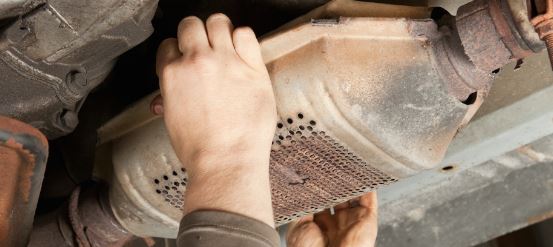Diesel cars have been around for a long time and, in most parts of the world, they are as common as petrol (gasoline) cars. But do diesel engines require catalytic converters to meet emissions regulations? And if so, how do diesel catalytic converters work compared to petrol engine catalytic converters?
In this blog post, we’ll take a look at the history of catalytic converters and explore how they work in modern vehicles.
Lets take a look!
What Are Catalytic Converters?
Catalytic converters are devices that are installed in the exhaust systems of cars and trucks. The purpose of a catalytic converter is to convert harmful emissions from the engine into less harmful gases before they are released into the atmosphere.
How Do Catalytic Converters Work?
Catalytic converters work by using a catalyst, which is a substance that helps chemical reactions occur more quickly. The most common type of catalyst used in catalytic converters is platinum. Platinum is a very efficient catalyst for converting harmful emissions from vehicles.
When the exhaust from the engine passes over the platinum catalyst, the platinum helps to convert the harmful emissions into less harmful gases.
What Are The Benefits Of Catalytic Converters?
There are many benefits of catalytic converters. One of the most important benefits is that they help to reduce air pollution. Catalytic converters also help to improve fuel economy and reduce engine noise. In addition, catalytic converters can also help to extend the life of your engine by reducing wear on engine parts.
What Are The Different Types Of Catalytic Converters?
There are two types of catalytic converters, two-way and three-way. Two-way converters are more common and less expensive. They work by converting carbon monoxide and hydrocarbons into carbon dioxide and water vapor. Three-way converters are more costly but they also help reduce nitrogen oxide emissions.
If your car is older, it likely has a two-way converter. Newer cars have three-way converters because they’re required to meet stricter emission standards.
Do Diesel Engined Cars Have Catalytic Converters?
Diesel cars do have catalytic converters, but the type of converter is different from what is used in petrol cars. Diesel engines use a NOx (Nitrogen Oxides) catalyst, which helps to reduce emissions of nitrogen oxides.
The main difference between diesel and petrol engine catalytic converters is that diesel converters are designed to operate at higher temperatures. This is because the combustion process in a diesel engine is different from a petrol engine, and produces higher levels of nitrogen oxides.
The other main difference between diesel and petrol car catalytic converters is that diesel engines use a particulate filter. This filter captures soot and other particles that would otherwise be emitted from the exhaust pipe. Particulate filters can become clogged over time, and need to be replaced periodically. Other issues with the DPF include failing sensors, you can find out more about those issues here – see now
Do Diesel Engines Use Two Way Or Three Way Catalytic Converters?
Diesel engines use two way catalytic converters. Three way catalytic converters are not used in diesel engines. Two way catalytic converters are more efficient than three way catalytic converters. This is because three way catalytic converters rely on a chemical reaction to convert pollutants into harmless gases, while two way catalytic converters rely on a physical reaction to do the same thing.
Why is this so?
The main reason has to do with the fact that diesel fuel contains more sulfur than gasoline. Sulfur interferes with the chemical reaction that takes place inside a three-way converter, making it less effective at cleaning up exhaust fumes. That’s why most diesels are equipped with a two-way converter instead.
Is This Always The Case?
There are a few exceptions, however. Some newer diesels have been designed to run on ultra-low sulfur diesel (ULSD) fuel, which contains very little sulfur. These engines can use a three-way converter without any problems. And in Europe, where ULSD is the norm, most diesel vehicles are equipped with three-way converters. But in the United States, where regular diesel fuel is still the norm, two-way converters are still the rule rather than the exception.
Two way catalytic converters are more efficient than three way catalytic converters for several reasons:
1)Diesel fuel contains more sulfur than gasoline. Sulfur interferes with the chemical reaction that takes place inside a three-way converter, making it less effective at cleaning up exhaust fumes.
2)Three-way converters rely on a chemical reaction to convert pollutants into harmless gases, while two way catalytic converters rely on a physical reaction to do the same thing.
3)Two way converters are less expensive than three way converters. This is because they are simpler in design and construction.
4)Two way converters are easier to maintain than three-way converters. This is because they have fewer parts and require less regular servicing.
How Long Do Diesel Catalytic Converters Last?
Diesel catalytic converters can last anywhere from 20,000 to 200,000 miles. However, it is important to note that this is just an estimate. The actual lifespan of a diesel catalytic converter will depend on a number of factors, including the make and model of the vehicle, the quality of the fuel being used, and driving habits.
Some drivers may never need to replace their diesel catalytic converter. Others may need to replace theirs more frequently. It really all depends on how you drive and treat your vehicle.
If you want your diesel catalytic converter to last as long as possible, there are a few things you can do:
-First, make sure you’re using good quality diesel fuel. This will help to prevent build-up and clogging inside the converter.
-Second, avoid short trips whenever possible. These types of trips put more stress on the engine and can lead to increased wear and tear on the catalytic converter.
-Third, practice proper engine maintenance. This includes things like regularly changing your oil and air filter, as well as getting tune-ups when needed. Keeping your engine in good shape will help to extend the life of your diesel catalytic converter.
By following these simple tips, you can help to ensure that your diesel catalytic converter lasts for as long as possible. Proper care and maintenance is key to prolonging the life of any vehicle component – and that includes the catalytic converter.
What Are Some Signs You Might Have Issues With Your Diesel Catalytic Converter?
There are a few signs that you might have issues with your diesel catalytic converter:
- If you notice that your engine is running rougher than usual, it could be a sign that the converter is not functioning properly.
- If you notice an increase in engine noise, such as knocking or pinging, it could also be a sign of trouble.
- If you see an increase in exhaust smoke or fumes, this is another indication that something might be wrong with the converter.
If you notice any of these signs, it’s important to have your vehicle checked out by a qualified mechanic as soon as possible. Ignoring problems with the catalytic converter can lead to further damage to the engine – and that can be expensive to fix.
If you think you might have an issue with your diesel catalytic converter, the best course of action is to have your vehicle checked out by a qualified mechanic. They will be able to diagnose the problem and recommend the best course of action.
Go Home









